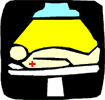 | Sleepy Doctors Similar to
Drunk Doctors Alcohol and lack of sleep cause similar cognitive problems |
 September 10, 2005
September 10, 2005If you were sick, would you go to a doctor who had been drinking alcohol? Probably not! But even if doctors haven't taken a sip of alcohol, if they have been working long hours, their skills and reaction times may be no better than if they were slightly drunk. That is the conclusion of a study published in the September 7, 2005, issue of the Journal of the American Medical Association. Dr. J. Todd Arnedt of the University of Michigan and his colleagues studied 34 young doctors (mean age 28.7 years) who worked in two different conditions: Light Call - doctors worked a 4-week daytime shift, averaging 44 hours per week.
Heavy Call - doctors worked a 4-week shift of 80-90 hours per
week. They also worked 34 to 36 consecutive hours every 4 to 5 days.
During the last week of either the light or heavy call condition, the doctors were given either alcoholic drinks or a drink without alcohol (a placebo) and tested for the sleepiness, attention, and driving ability (on a simulator). The alcoholic drinks raised the blood alcohol concentration (BAC) of the doctors to about 0.05%. It is illegal to drive a motor vehicle with a BAC at or above 0.08% in the United States. However, driving can be impaired at BAC levels below 0.08%.
Sleep Deprived DoctorsFor the entire week before the tests, doctors on light call slept an average of 7.32 hours each night; doctors on heavy call slept an average of only 6.17 hours each night. On the day before the tests, doctors on light call got 6.37 hours of sleep, but doctors on heavy call got only 3.02 hours of sleep.Alcohol and the heavy call condition affected the doctors in a similar way. Compared to doctors in the light call condition (no alcohol), doctors in the light call condition who drank alcohol AND doctors in the heavy call condition who were given placebo drinks:
Loss of Sleep Affects Abilities This experiment shows that long work hours and alcohol cause similar
attention and driving problems. Would long work hours cause the doctors
to make errors while treating patients? Although this question was not
studied in the experiment, many medical decisions and tasks require
abilities that are similar to those tested in this study.
This experiment shows that long work hours and alcohol cause similar
attention and driving problems. Would long work hours cause the doctors
to make errors while treating patients? Although this question was not
studied in the experiment, many medical decisions and tasks require
abilities that are similar to those tested in this study.You would not want an alcohol-impaired doctor treating you...a sleepy doctor may be no better! |
|
References and Links:
|
| BACK TO: | Neuroscience In the News | Table of Contents |
![[email]](./gif/menue.gif) Send |
 Fill out survey |
 Get Newsletter |
 Search Pages |
